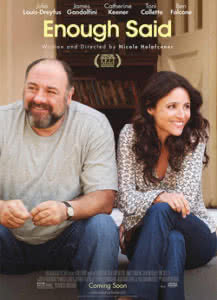Enough Said

(2013, Nicole Holofcener, 93 minutes)
In his final film, James Gandolfini is extraordinary. For years, Gandolfini mastered the portrayal of the ultimate bad-boy that women fell for against all better judgement. In Enough Said, a new film by Nicole Holofcener, Gandolfini portrays Albert, a warm-hearted, middle-aged, television historian. With his large and gentle heart, this anti-Tony Soprano embodies the ultimate good-guy that women often mistakenly overlook.
As a therapist, one of my specialities is helping clients stop choosing “Tony Sopranos” and start choosing “Alberts”.
When Eva (Julia Louis-Dreyfus) meets Albert, she seems intrigued but conflicted. Early on, Eva is compelled to let Albert know she is not sure if she can actually kiss him. From their very first interaction, their chemistry and compatibility is undeniable. They are both divorced parents of daughters who are about to leave for college. They seem completely real with each other, and at ease. They share a dry sense of humor.
Yet their relationship is marred by Eva’s insecurity. At first, when Albert has an unexpected encounter with Eva’s daugher’s best friend and makes a great impression, Eva is unduly swayed by the teenager’s viewpoint. It seems as if she needs permission to proceed with what is unfolding as a great relationship, and she is looking for this permission in all of the wrong places.
As this well-suited couple continue to grow closer, Eva’s character flaws become highlighted. Upon discovering that her glamorous new friend and massage therapy client Marianne (Catherine Keener) is actually Albert’s first wife, Eva walks through a highly dysfunctional door that Marianne unknowingly opens as she begins spilling her guts about the myriad of reasons she divorced.
What writer/director Holofcener understands so well is the human tendency to worry too much about what other people think. This inclination to over-value the opinions of others is often most noticeable and most problematic when it comes to dating and choosing romantic partners. Eva impulsively sabotages her otherwise romanic love story by likening Marianne to the ultimate “Trip Advisor” and equating Albert to a questionable hotel room. She reasons that if people routinely collect information from travelers to avoid staying in bad hotel rooms, why not do the same thing with relationships? The more Eva hears from Marianne about Albert’s flaws, the more it undermines her ability to form an independent bond with Albert.
When someone values the opinions of others over their own views, they are basically handing over a large piece of themselves to people who may not share their values or interests. Eva learns the important lesson that in order to have a happy, healthy, romantic relationship, one must possess a strong sense of self and therefore possess the ability to prioritize their own values, opinions and desires. If you are looking to examine your patterns in dating, and you think you may have a pattern of overlooking suitable and available romantic partnters, Eva’s trajectory in this heartwarming relationship will be an inspiration worth viewing.
